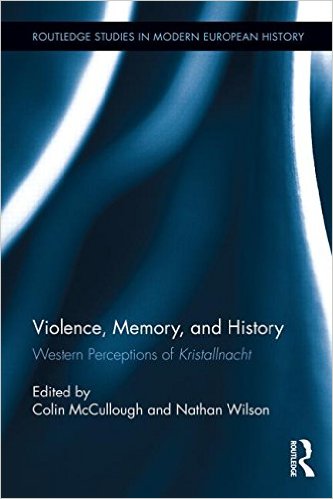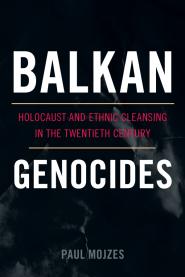Who was Benjamin Murmelstein? Why would Claude Lanzmann dedicate over 3 hours to him in his latest film The Last of the Unjust? Murmelstein was a rabbi and teacher from Vienna, third Jewish elder of the Thereseinstadt ghetto, and the only surviving Jewish elder of any of the Jewish Councils set up by the Nazis. Condemned by many in the Jewish Community as a traitor and a Nazi collaborator he was tried and acquitted by the Czech authorities after the war settling in exile in Rome where he lived until his death in 1989.
more...
Last month, the EU’s Agency for Fundamental Rights (FRA) released a comprehensive study on the experiences of antisemitism among Jews in 8 European countries (Belgium, France, Germany, Hungary, Italy, Latvia, Sweden, and the United Kingdom)-whose Jews comprise 90% of the EU’s total Jewish population.
Kristallnacht: Violence, Memory, and History
Edited by Nathan Wilson, Colin McCullough
 What did people hear about Kristallnacht outside of Germany in 1938 from governments and media sources? How did governments and ordinary people respond to the plight of the Jewish community there? How have lives been affected by Kristallnacht in the seventy years since its occurrence? This interdisciplinary study of erasure and enshrinement seeks to answer these questions, exploring issues of memory and forgetting (in both the material and symbolic sense), and how the meaning of Kristallnacht has been altered by various actors since 1938.
What did people hear about Kristallnacht outside of Germany in 1938 from governments and media sources? How did governments and ordinary people respond to the plight of the Jewish community there? How have lives been affected by Kristallnacht in the seventy years since its occurrence? This interdisciplinary study of erasure and enshrinement seeks to answer these questions, exploring issues of memory and forgetting (in both the material and symbolic sense), and how the meaning of Kristallnacht has been altered by various actors since 1938.
An extraordinary international exhibit is touring Minnesota this month: Lawyers without Rights. Jewish Lawyers in Germany Under the Third Reich. The display was created by the German and American Bar Associations and was brought here as an outreach initiative of the Federal District Court of Minnesota. The exhibit reflects a time in Germany when individual rights and the rule of law were systematically disregarded. more...
Myron Kunin passed away at the age of 85 last week. It was Myron’s passion for art that brought him together with Stephen Feinstein. Together they curated Witness and Legacy, a major commemorative art exhibition to mark the 50th anniversary of the liberation of Auschwitz that debuted in St. Paul in 1995 and traveled until 2002. That collaboration began the friendship and vision that lead to the founding of our Center in 1997.
We will honor Myron’s his legacy as we strive to fulfill our mission of educating all sectors of society about the Holocaust and other genocides.
May his memory be a blessing to us all.
Obituary: Myron Kunin, businessman, patron of the arts
Star Tribune 10-31-2013

My Parents II, 1946. Henry Koerner (1915-1991)
This painting from Myron Kunin’s collection has been associated with the Center since it was used to promote the Absence/Presence exhibition of 1999. It was also used as the cover photo for Dr. Stephen Feinstein’s book of the same name.
The Order Has Been Carried Out: History, Memory, and Meaning of a Nazi Massacre in Rome
by Allesandro Portelli
Winner of the 2005 Oral History Association Book Award
 On March 24, 1944, Nazi occupation forces in Rome killed 335 unarmed civilians in retaliation for a partisan attack the day before. Alessandro Portelli has crafted an eloquent, multi-voiced oral history of the massacre, of its background and its aftermath. The moving stories of the victims, the women and children who survived and carried on, the partisans who fought the Nazis, and the common people who lived through the tragedies of the war together paint a many-hued portrait of one of the world’s most richly historical cities. The Order Has Been Carried Out powerfully relates the struggles for freedom under Fascism and Nazism, the battles for memory in post-war democracy, and the meanings of death and grief in modern society.
On March 24, 1944, Nazi occupation forces in Rome killed 335 unarmed civilians in retaliation for a partisan attack the day before. Alessandro Portelli has crafted an eloquent, multi-voiced oral history of the massacre, of its background and its aftermath. The moving stories of the victims, the women and children who survived and carried on, the partisans who fought the Nazis, and the common people who lived through the tragedies of the war together paint a many-hued portrait of one of the world’s most richly historical cities. The Order Has Been Carried Out powerfully relates the struggles for freedom under Fascism and Nazism, the battles for memory in post-war democracy, and the meanings of death and grief in modern society.
“Students here seem to have a more emotional connection to the Holocaust”
 Falko Schmieder is a DAAD visiting professor at the University of Minnesota and is currently teaching the course “History of the Holocaust.” He has studied Communications, Political Science and Sociology at various German Universities. Since 2005 he has worked as a researcher at the Center for Literary and Cultural Research Berlin. Together with Matthias Rothe, the course “Adorno, Foucault, and beyond” is being offered through the Department of German, Scandinavian and Dutch. Falko Schmieder will give a lecture at the CHGS Library (room 710 Social Sciences) on The Concept of Survival on November 20th at 12 p.m. more...
Falko Schmieder is a DAAD visiting professor at the University of Minnesota and is currently teaching the course “History of the Holocaust.” He has studied Communications, Political Science and Sociology at various German Universities. Since 2005 he has worked as a researcher at the Center for Literary and Cultural Research Berlin. Together with Matthias Rothe, the course “Adorno, Foucault, and beyond” is being offered through the Department of German, Scandinavian and Dutch. Falko Schmieder will give a lecture at the CHGS Library (room 710 Social Sciences) on The Concept of Survival on November 20th at 12 p.m. more...
Last June, the allegation that a 94 year old Ukrainian immigrant living in Northeast Minneapolis could have been a top commander of a Nazi- SS lead unit, received international media attention. The public’s response was polarized as for as many who felt justice needed to be served there were just as many who felt that we should leave him alone. Should a person’s chronological age prevent them from being accountable for their crimes? more...
Balkan Genocides: Holocaust and Ethnic Cleansing in the Twentieth Century
By Paul Mojzes
 During the 20th century, the Balkan Peninsula was affected by three major waves of genocides and ethnic cleansings, some of which are still being denied today. In Balkan Genocides Paul Mojzes provides a balanced and detailed account of these events, placing them in their proper historical context and debunking the common misrepresentations and misunderstandings of the genocides themselves.
During the 20th century, the Balkan Peninsula was affected by three major waves of genocides and ethnic cleansings, some of which are still being denied today. In Balkan Genocides Paul Mojzes provides a balanced and detailed account of these events, placing them in their proper historical context and debunking the common misrepresentations and misunderstandings of the genocides themselves.
A native of Yugoslavia, Mojzes offers new insights into the Balkan genocides, including a look at the unique role of ethno-religiosity in these horrific events and a characterization of the first and second Balkan wars as mutual genocides. Mojzes also looks to the region’s future, discussing the ongoing trials at the International Criminal Tribunal in Yugoslavia and the prospects for dealing with the lingering issues between Balkan nations and different religions.Balkan Genocides attempts to end the vicious cycle of revenge which has fueled such horrors in the past century by analyzing the terrible events and how they came to pass.
